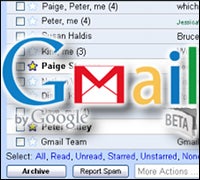 |
Google’s Gmail has earned a unique distinction as one of the longest running programs to maintain a “beta” designation since its debut five years ago. Well the jokes about “Is Google ever going to finish this thing?” should start to peter out with today’s news that the e-mail program no longer has the beta tag.
“For every product we have goals for feature completeness and we feel we’ve now met them,” Rajen Sheth, a senior product manager for Google Apps, told InternetNews.com.
Google
“We were finding that many of the corporations we were selling to looked at our SLAs and saw (it wasn’t) like a traditional beta, but still it was enough to block some of them from even evaluating the applications,” he said.
Nucleus Research analyst Rebecca Wettemann said the beta tag was clearly a concern for enterprise customers and Google’s move was overdue.
“I understand their perspective that you want to label it a certain way until you think it’s perfect especially when you think about so many products that have come out of beta before they were ready too,” Wettemann told InternetNews.com. “But it became a branding issue they needed to deal with if they were going to be taken seriously by enterprise customers.”
In addition to Gmail, Google said more recent additions to its apps suite of programs — Google Calendar, Google Docs and Google Talk — are out of beta. Google Sites and Google Video for business lost the beta designation earlier this year.
New enterprise features
Google also released new features designed specifically for enterprise customers. These include live replication of data to other locations for what the company calls “near-instant data recovery.”
Data recover is standard for enterprises as part of their datacenter infrastructure. “But it’s a very expensive thing to do, we’re making it available for Google Apps as part of the standard licensing costs,” said Sheth.
Google said it’s releasing several other features over the course of the next few weeks, including the ability to delegate an e-mail inbox to an executive assistant. “We’ve seen that in large enterprises, it’s greatly needed,” said Sheth.
Administrators will also gain the ability to set corporate-wide retention policies. For example, an admin would be able to designate e-mails be deleted after 100 days. Google also offers archiving features for public companies and others that need to retain e-mails for a longer people of time.
Fairchild in Google’s camp
Google also announced a major customer win, that of Fairchild Semiconductor. The chip company said its move from a Lotus Notes environment to Google Apps for its 5,500-plus employees in 18 offices worldwide will save it about $500,000 a year. The savings include reduced software licensing, administrative and maintenance costs.
“One of the big value propositions for them is that it’s easier to deploy cloud-based e-mail than maintain their legacy system,” said Sheth.
The migration to Gmail took about three weeks.
Wettemann noted that Fairchild joins Genentech and a few other big name customers Google has publicized. “Google needs o get more of those big reference accounts like Fairchild to be taken as a serious player in the enterprise. They need a mix of different kinds of companies.”


